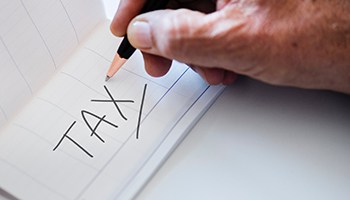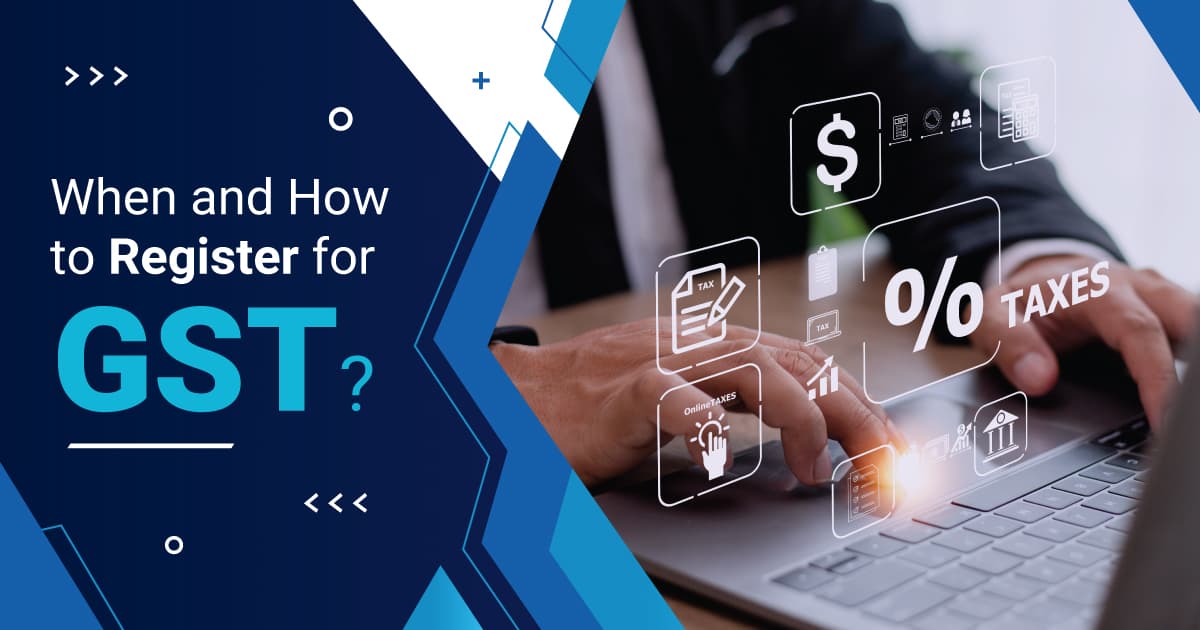Inside the Content
- What is GST?
- What is a Taxable Turnover?
- When Should I Register for GST?
- Can I Register for GST Voluntarily?
- What Are the Advantages of Voluntary GST Registration?
- Are There Exemptions From GST Registration?
- When Does the GST Registration Take Effect?
- How Will My Businesses by Registered for GST?
- What Are My Responsibilities as a GST-Registered Business?
- What Are the Consequences of Late Registration?
- What Are The Consequences of Non/Late Filing or Non/Late Payment of GST?
- Register and File Your GST With Rikvin
Consuming goods and services in Singapore, as well as imports, is liable to GST, a type of tax. GST was first introduced in 1994, and has risen from 3% to 9% today (with effect from 1 Jan 2024).
In this article, we look at what GST is, what it covers, and how companies can register for it.
What is GST?

GST stands for Goods and Service Tax. It is the equivalent of Value Added Tax (VAT) that is levied in some countries.
GST is a broad-based consumption tax collected on all supplies of goods and services made in Singapore, as well as goods and services imported into Singapore.
The liability to register for GST arises based on the value of the taxable turnover that the business generated from the supply of goods and services playing a crucial role in the country’s fiscal framework. This tax system aims to ensure a fair and equitable distribution of the tax burden across various economic activities.
What Companies Must Register GST?
A business must be registered for GST if:
- Its turnover from taxable supplies had exceeded S$1 million in the past 12 months (retrospective view)
- It is likely to exceed S$1 million in the next 12 months (prospective view)
What is a Taxable Turnover?
| Sole Proprietorship | Limited Liability Partnership (LLP) | Company (e.g. Private Limited business) |
|---|---|---|
| The combined revenue, fees, and income earned from business, self-employment, profession, or vocation, rental of commercial properties, furniture and fittings | The turnover of all partnership businesses with the same composition of partners and the rental of commercial properties, furniture, and fittings | The turnover of that particular company, and if the company owns any sole-proprietorship, then the turnover of all such sole-proprietorship must be included in taxable turnover |
Note that standard-rated (9% GST) and zero-rated (0% GST) supplies are part of the taxable turnover; exempt supplies and transactions that are out-of-scope are not part of taxable turnover.
- The export of goods from Singapore and international Services, as described in Section 21(3) of the GST Act are zero-rated. Not all services offered to overseas customers are zero-rated.
- The sale and lease of bare residential property and most financial services are exempted.
- Third-country sales of goods that do not enter Singapore (goods in transit) and dividend income are out-of-scope supplies.
When Should I Register for GST?
Retrospective Registration
The liability to register for GST will be determined by computing taxable turnover on a calendar year basis instead of a quarterly basis.
If the taxable turnover at the end of any calendar year is more than S$1 million, the business must register for GST by 30 Jan. You must monitor at the end of every calendar year, 31 Dec, and register for GST if the annual taxable turnover exceeds S$1 million.
Prospective Registration
A business has to register for GST if it has reasons to believe that its revenue from taxable supplies in the next 12 months will be more than S$1 million.
Supporting documents must be submitted to substantiate your forecast value of S$1 million. They include:
- Contracts
- Agreed quotations
- Confirmed purchase orders from customers
- Invoices to customers
- Income statements that show the past 12-month period was already close to reaching S$1 million and annual turnover is clearly on an increasing trend.
However, if the revenue from taxable supplies is not likely to exceed S$1 million in the next 12 months, the business need not register for GST.
Application for registration for GST must be made via myTax Portal within 30 days from the date the liability to register arises.
Reverse Charge and Overseas Vendor Registration
Your company may be required to register for GST if it meets either requirement:
- Under the reverse charge regime, your business obtains services from suppliers overseas or imports low-value goods. It is also not entitled to the complete input tax credit even if it is GST-registered
- Under the overseas vendor registration regime, you are an:
- Overseas supplier
- Local or overseas electronic marketplace operator or redeliver that offers services, whether digital or non-digital
- Supplies imported low-value goods to individuals and firms in Singapore that are non- GST-registered
Can I Register for GST Voluntarily?
A business that is not required to register for GST may apply for registration voluntarily if the business satisfies any of the following:
- It makes taxable supplies
- Makes only out-of-scope supplies
- It makes exempt supplies of financial services
- Obtains services from service providers overseas or imports low-value products and would not be given full input tax credit even if GST-registered.
Even if it only intends to, but is not actually making any of the above supplies, the business may still apply for GST registration. However, if the intentions are not firm, it should not apply for registration.
The company director/sole proprietor /partner/trustee applying for voluntary GST registration must complete an e-learning course and pass the quiz before submitting the registration form.
The purpose of the e-learning course is to ensure that the applicants have a thorough understanding of the obligations and responsibilities of being registered for GST.
However, this condition may be waived, subject to conditions. Additionally, the business must sign up for GIRO for payment and/or refund of GST and provide the security deposit imposed by the Comptroller on a case-by-case basis.
What Happens After Voluntary GST Registration?
Upon voluntary registration, the business must remain registered for at least 2 years. It must also make taxable supplies within 2 years, if not making taxable supplies at the point of application.
Also, the director/partner or sole proprietor, as the case may be, must complete the e-learning course “Introduction to GST” within 3 months from the effective date of registration and be on GIRO arrangement for payment and/or refund of GST.
Notably, the Comptroller may also impose additional conditions and cancel its GST registration if any of the conditions are not met.
What Are the Advantages of Voluntary GST Registration?
One significant advantage of voluntary GST registration is that the business can claim the input tax or the GST paid on its purchases.
However, input tax is claimable only if it is attributable to the making of taxable supplies. So, if the business is making partially exempt supplies and has both business and non-business activities, then it will not be able to claim all its input tax.
The costs may outweigh the benefits, so the profile of the suppliers and customers as well as the nature of the supplies made must be carefully considered.
If the customers are not GST-registered, the business may be constrained in charging them GST as its customers cannot claim the GST paid.
Charging GST on such customers could lead to customer attrition. Likewise, only when the suppliers are GST-registered or if the business is importing its supplies, it will be able to claim the GST paid.
If the supplies are zero-rated, though there is no impact on the selling price the business will still be able to claim the GST incurred on its purchases if the business is GST-registered.
Are There Exemptions From GST Registration?
A business will be exempted from GST registration if:
- All or most of its revenue is from zero-rated supplies and if being registered will lead it to claim input GST, then it may apply for an exemption by submitting the GST F2 Form
- The business is liable to register only retrospectively. It must have reasons to believe that the turnover for the next 12 months will not exceed S$1 million. The taxable revenue is estimated to be lower due to specific circumstances such as scaling down of the business, termination of the sales contract, cancellation of license or distribution rights or cessation of business
- The business has supporting documents to corroborate its stand such as:
- Proof of cancellation of contracts
- Payment of early termination fees
- Correspondence with customers regarding termination or cancellation of orders
- Notice of revocation of license
- Board resolution for downsizing
- Winding up
- Court orders
- Notification of downsizing
- Winding up or cessation of business to third parties
However, you need to monitor the taxable turnover to determine registration liability.
When Does the GST Registration Take Effect?
The effective date of registration is as follows:
In the case of compulsory retrospective registration, the business will be registered on the first day of the third month following the end of the calendar year.
In the case of compulsory prospective registration, the business will be registered on the 31st day from the date of the forecast.
On approval of the application, a letter notifying the GST registration number and the effective date of GST registration will be sent to you. GST should only be charged on sales made on or after the effective date of GST registration.
How will My Businesses be Registered for GST?

In the case of a sole proprietorship, registration will be in the name of the business owner/sole proprietor.
Therefore, all sole proprietorship businesses that the applicant owns at the time of registration and any sole-proprietorship business that the applicant registers eventually will also be included under the applicant’s name and become GST-registered.
Unlike a sole proprietorship, partnerships will be separately registered for GST under their own name.
Notably, if a partnership is registered for GST, then any other partnership that has been formed by the same set of partners or set up eventually by the same set of partners must be GST-registered.
In the case of companies, GST registration will be in the name of the company.
What Are My Responsibilities as a GST-Registered Business?
A GST-registered business has the following responsibilities:
- Charging and accounting 9% GST on standard-rated supplies
- Filing GST returns on time, within 1 month from the date of each accounting period. If there are no transactions during the said period a ‘Nil’ GST return must still be submitted
- Keeping proper records for at least five years
- Displaying prices inclusive of GST in the prescribed format, failure to comply is an offence that can result in a fine of up to $5,000
- Issuing tax invoices/customer accounting tax invoices, with GST registration number, for standard-rated supplies. If the invoice amount does not exceed S$1,000, a simplified tax invoice may be issued
- Paying the tax due within one month from the end of each accounting period
- Informing the Comptroller within 30 days after any change in the business circumstances, such as:
- Changes in GST mailing address
- Business constitution or ownership
- Changes in partners or particulars of partners
- Partnerships set up with the same composition of partners
GST-registered businesses must use Corppass to e-file their GST returns through myTax Portal and make payment to IRAS by the due date.
If e-filing a GST return for the first time or when there is a change in the person filing the GST return, the person filing the GST return has to be authorised for GST e-Service under Corppass by the GST-registered business.
If an agent files the GST return, the agent must be authorised in Corppass to act for the GST-registered business.
GST-registered companies or partnerships will need to register a Corppass Admin account with their Unique Entity Number (UEN). GST-registered sole proprietors must set up a GST Corppass Admin account for their respective GST registration numbers.
What Are the Consequences of Late Registration?

The following are the consequences of late registration:
- Date of registration will be backdated to the date when business became liable for registration
- Regardless of whether GST is collected from customers on the sales made after the business became liable for registration, GST for the past sales must be accounted for and paid from the effective date of registration, i.e., backdated period
- A fine of up to $10,000 and a penalty equal to 10% of the GST due may be charged for late registration. Prosecution action may also apply. However, IRAS generally waives the fine and penalties for late registration in the event of voluntary disclosure.
What Are The Consequences of Non/Late Filing or Non/Late Payment of GST?
A fine of up to S$5,000 and in default of payment, an imprisonment term of up to six months may apply in the failure to e-file. For late submission, a penalty of $200 will be charged immediately once the GST return is not filed by the due date.
A penalty of $200 will continue to be imposed for every month, up to a maximum of S$10,000 per outstanding return.
IRAS may issue a court summons to attend Court on a specified date. Should you wish to not do so, you must perform all of these actions at least 1 week before the Court date:
- File your outstanding GST returns
- Pay the composition amount
IRAS will issue an estimated assessment of the tax due, and the amount is subject to late payment penalties. The estimated assessment and late payment penalties will only be revised upon receipt of the overdue GST return.
For non/late payment, a 5% penalty will be levied on the amount of tax unpaid by the due date.
An additional penalty of 2% per month on tax remaining unpaid after 60 days from the due date of the prescribed accounting period (subject to a maximum of 50% of the outstanding tax) may also be imposed.
Register and File Your GST With Rikvin
Find GST complicated and confusing? Leave your GST matters to Rikvin’s expert taxation team. We are equipped with years of expertise to help your company manage your entire scope of taxation needs.
FAQs
- The implementation of GST allows Singapore to be reliant on indirect taxes instead of direct taxes.It also enables it to maintain a lower and more attractive income tax rate, and promotes savings and investments.
- Sometimes, it may make more financial sense to register for GST. Applicable companies may register for GST voluntarily even if they have not done so previously.
- You can engage a taxation expert like Rikvin to help you throughout the process while you focus on the core aspects of your business.
Need assistance with GST registration and filing?
At Rikvin, our team of accounts specialists are ready to help you with your GST registration and/or filing.

Rikvin’s content team includes in-house and freelance writers across the globe who contribute informative and trending articles to guide aspiring entrepreneurs in taking their business to the next level in Asia.


